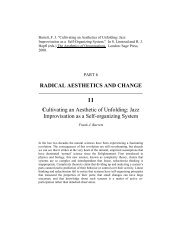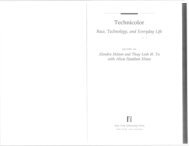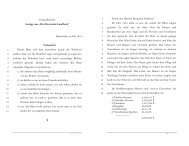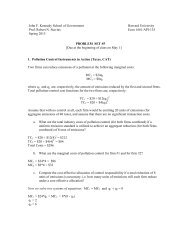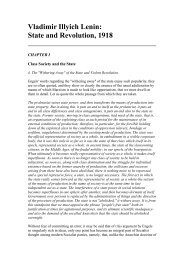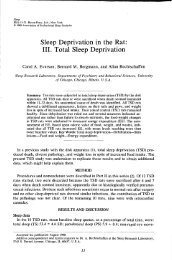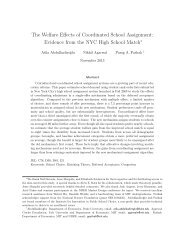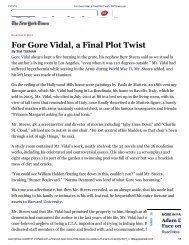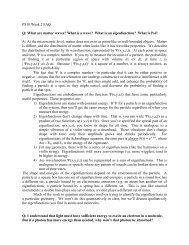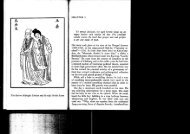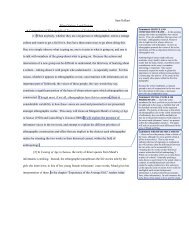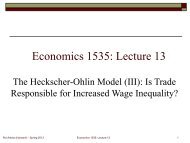A Guide to the ALM Thesis - iSites - Harvard University
A Guide to the ALM Thesis - iSites - Harvard University
A Guide to the ALM Thesis - iSites - Harvard University
Create successful ePaper yourself
Turn your PDF publications into a flip-book with our unique Google optimized e-Paper software.
Chapter 1: Introduction and Administrative Procedures | 7<br />
Chapter 1<br />
Introduction and Administrative Procedures<br />
The <strong>the</strong>sis, required of all candidates for <strong>the</strong> degree of Master of Liberal Arts (<strong>ALM</strong>) in Extension Studies, is <strong>the</strong><br />
focal point of <strong>the</strong> master’s program. This project, which provides an opportunity for original investigation in<br />
<strong>the</strong> field of concentration, demands a syn<strong>the</strong>sis of <strong>the</strong> skills and knowledge acquired throughout <strong>the</strong> candidate’s<br />
program of study. The completed work is <strong>the</strong> evidence that <strong>the</strong> research has been accomplished and<br />
communicated <strong>to</strong> o<strong>the</strong>rs in a conventional format.<br />
It is useful, <strong>the</strong>refore, <strong>to</strong> begin <strong>to</strong> think about <strong>the</strong> project well before commencing <strong>the</strong> preliminary research.<br />
Unsuitable areas of research can be eliminated; interesting questions can be defined; <strong>the</strong> relevant literature can<br />
be reviewed. With such advance preparation, <strong>the</strong> <strong>the</strong>sis will provide an even greater opportunity <strong>to</strong> achieve an<br />
integration of <strong>the</strong> work within <strong>the</strong> master’s program. Candidates are encouraged <strong>to</strong> examine prior <strong>the</strong>ses on<br />
reserve at Grossman Library (third floor, Sever Hall), which illustrate all of <strong>the</strong>se procedures.<br />
Facilities and Opportunities<br />
The use of published materials in <strong>the</strong> <strong>University</strong> libraries, as well as electronic resources, is part of any successful<br />
research project, but many o<strong>the</strong>r resources amplify <strong>the</strong>se holdings. Examples at <strong>Harvard</strong> include collections<br />
in <strong>the</strong> museums, archives, observa<strong>to</strong>ries, and specialized libraries such as those in <strong>the</strong> Fogg Museum and <strong>the</strong><br />
Medical School. In addition, materials are available at <strong>to</strong>wn and city libraries and <strong>the</strong> specialized libraries in<br />
<strong>the</strong> Greater Bos<strong>to</strong>n area. Candidates for degrees in <strong>the</strong> biological and behavioral sciences, in particular, and in<br />
some social science fields are typically expected <strong>to</strong> prepare a <strong>the</strong>sis based on <strong>the</strong> collection of original empirical<br />
data employing ei<strong>the</strong>r experimental or correlational design. This may take <strong>the</strong> form of labora<strong>to</strong>ry research,<br />
experimental or quasi-experimental methods, field research, or survey methods. These <strong>the</strong>ses are most often<br />
quantitative investigations, although a qualitative component may also be included. Such a project usually<br />
requires experience in research design and statistical methods derived from course work, background reading,<br />
or experience as a research assistant. The <strong>ALM</strong> program offers an opportunity <strong>to</strong> develop capabilities in using<br />
<strong>the</strong>se academic <strong>to</strong>ols. Most important for any <strong>ALM</strong> research, empirical or analytical, are <strong>the</strong> proseminars—HUMA<br />
E-100, BIOS E-200, and SSCI E-100a and b—required of all candidates for <strong>the</strong> <strong>ALM</strong> degree. In general, candidates<br />
are required <strong>to</strong> take <strong>the</strong> proseminar in <strong>the</strong> area of <strong>the</strong> proposed concentration. However, candidates should<br />
choose <strong>the</strong>ir proseminars carefully in order <strong>to</strong> learn <strong>the</strong> methods most appropriate <strong>to</strong> <strong>the</strong> intended <strong>the</strong>sis work<br />
ahead. In some cases, it may even be in <strong>the</strong> candidate’s best interest <strong>to</strong> take a second proseminar if <strong>the</strong> <strong>the</strong>sis<br />
method differs dramatically from <strong>the</strong> method taught in <strong>the</strong> area proseminar. For example, psychology and<br />
biological sciences candidates interested in preparing a <strong>the</strong>sis that takes an his<strong>to</strong>rical approach <strong>to</strong> <strong>the</strong> study of<br />
science or his<strong>to</strong>ry of psychology would greatly benefit from exposure <strong>to</strong> <strong>the</strong> material in <strong>the</strong> seminar emphasizing<br />
his<strong>to</strong>ry and government. Similarly, candidates in linguistics or anthropology may need exposure <strong>to</strong> behavioral<br />
science methods prior <strong>to</strong> designing a <strong>the</strong>sis study.<br />
No student should reject a research project based on <strong>the</strong> collection of original data, or on <strong>the</strong> use of special<br />
collections, simply because he or she has not had prior experience in using such materials. Research advisors are<br />
available <strong>to</strong> help candidates evaluate <strong>the</strong> feasibility of such projects and <strong>to</strong> suggest ways of making appropriate<br />
preparations. In this regard, <strong>the</strong> student is reminded <strong>to</strong> follow, when <strong>the</strong>y are applicable, <strong>the</strong> published<br />
guidelines of <strong>the</strong> Committee on <strong>the</strong> Use of Human Subjects, prepared by <strong>the</strong> Faculty of Arts and Sciences and<br />
presented <strong>to</strong> <strong>the</strong> Institutional Review Board. <strong>Harvard</strong> Extension provides no funds or grants <strong>to</strong> students <strong>to</strong> offset<br />
<strong>the</strong> cost of <strong>the</strong>ir research projects. Fur<strong>the</strong>rmore, students are expected <strong>to</strong> make <strong>the</strong>ir own arrangements <strong>to</strong><br />
secure needed labora<strong>to</strong>ry space.<br />
A <strong>Guide</strong> <strong>to</strong> <strong>the</strong> <strong>ALM</strong> <strong>Thesis</strong>



